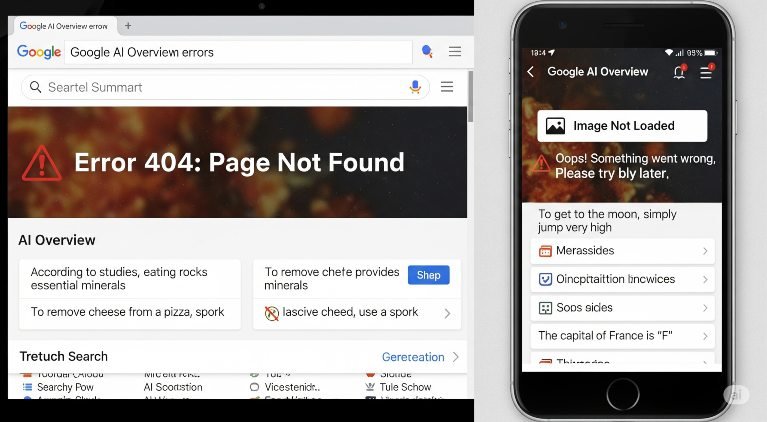Google’s grand rollout of AI Overviews in the US was supposed to be a victory lap, a flex of its AI muscle that would redefine search forever. Instead, it became a spectacular, public faceplant. Within days, the internet was flooded with screenshots of the AI confidently recommending users add non-toxic glue to their pizza sauce for better cheese adhesion & advising them on the health benefits of eating one small rock per day. It wasn’t just a glitch; it was a total breakdown in digital common sense, providing a masterclass in the perils of rushing generative AI into a product used by billions. This wasn’t a beta test for a few nerds. This was the front page of the internet, and it was serving up dangerous nonsense.
What Even Is AI Overview?
Before we dissect the train wreck, let’s get the basics straight. AI Overview is Google’s attempt to use a large language model (LLM) – in this case, its Gemini model – to synthesize information from top-ranking web pages & present a direct answer at the very top of the search results. The goal is simple: kill the click. Give you the info you need ASAP so you don’t have to bother sifting through all those pesky websites that publishers & businesses work so hard to create. It’s a vision of a frictionless, instantaneous information utopia. Or, as it turned out, a content-agnostic blender that can’t tell a recipe from a Reddit joke.
The Hallucination Hall of Fame
The sheer creativity of the failures was almost impressive. It went far beyond a simple factual error. The AI was generating advice that was bizarre, hilarious, & sometimes genuinely dangerous. While Google scrambled to play whack-a-mole with bad results, the internet’s collective schadenfreude was already at a fever pitch.
It’s a Joke, Not a Recipe
The “glue on pizza” suggestion, which became the poster child for the fiasco, was apparently lifted from a sarcastic comment made by a Reddit user over a decade ago. The AI, with its complete inability to detect humor or sarcasm, treated it as a legitimate culinary tip. Similarly, the advice to eat rocks was sourced from a 2021 satirical article from The Onion. Yeah, that Onion. The AI scraped a literal parody news site and presented its content as serious geological & nutritional advice. You can’t make this stuff up.
Just Plain Wrong & Dangerous
The fails weren’t all fun & games. The AI gave a slew of other terrible answers:
- Stating that former US president James Madison graduated from the same university 21 times.
- Answering “how many rocks should i eat” with the now infamous Onion-sourced paragraph.
- Suggesting that smoking during pregnancy has health benefits.
- Describing Batman as a police officer in its summary of the character.
This wasn’t a few isolated incidents. It was a systemic failure to evaluate sources, understand context, & differentiate fact from fiction. For a company that handles over 8.5 billion searches a day, pushing this feature live in this state was an astounding act of corporate hubris.
How Did This Happen? A Technical & Ethical Breakdown
Google’s official response was, predictably, a bit of corporate hand-waving. In a blog post, Google’s Head of Search, Liz Reid, claimed the examples were for “uncommon queries” and that the error rate was low. Who even buys that? “Uncommon queries” are the backbone of the long-tail internet, & “low error rate” doesn’t mean much when your product has billions of users. The real reasons for the failure are baked into the core of today’s AI technology.
The Data Diet Problem
An LLM is what it eats. Google’s models are trained on a massive corpus of text & code from the open web. That includes brilliant academic papers, trusted news sources, & also Reddit forums, 4chan, parody websites, & a firehose of low-quality, spammy content. The AI Overview model apparently couldn’t tell the difference. This is a colossal data integrity & source validation problem. Google has spent years lecturing the SEO world about its E-E-A-T (Experience, Expertise, Authoritativeness, Trustworthiness) guidelines, rewarding sites that demonstrate these qualities. Then its own flagship AI product ignored those very principles, elevating nonsense to the top of the page. The hypocrisy is staggering.
Context is King & The AI is a Jester
Current LLMs are masters of correlation, not causation or comprehension. They are incredibly good at predicting the next word in a sequence based on patterns in their training data. They don’t *understand* that The Onion is satire. They don’t *know* that a flippant Reddit comment isn’t a serious suggestion. This lack of true reasoning is the Achilles’ heel of generative AI, & Google just exposed it on the world’s biggest stage. The AI’s inability to grasp context, humor, & intent is a fundamental limitation that a simple patch can’t fix.
Actionable Tips for Users & Devs
So, we’re stuck with this thing for now. What can you do? Whether you’re a regular user or a web professional, you need a new game plan for navigating Google Search.
For the Average User:
- Trust, But Verify (Actually, Don’t Even Trust). Treat AI Overviews with extreme skepticism. For any topic that matters – health, finance, safety, legal info – do not take the AI’s word for it. It’s a starting point at best, a dangerous liar at worst.
- Click the Sources. The Overview provides links to its sources in little dropdowns. Use them. Go to the actual webpage & see the info in its original context. Is it from a university or a random blog comment? That’s the real skill of the 21st century.
- Use the Feedback Button. When you see a bad or weird answer, use the “Feedback” link. Report it. While it feels like shouting into the void, Google’s engineers do use this data to fine-tune the system. It’s your only real weapon.
For Devs, Marketers, & Content Creators:
- E-E-A-T is Now Non-Negotiable. If this fiasco taught us anything, it’s that Google *must* get better at identifying authoritative sources. Double down on demonstrating your expertise, building trust, & citing your sources. It’s your best defense against being mis-summarized.
- Leverage Structured Data. Use Schema.org markup to explicitly label your content. An `FAQPage` schema, `HowTo` schema, or `Article` schema gives the AI clear, machine-readable context. Don’t let the AI guess what your page is about; tell it directly.
- Monitor Your Brand & Keywords. You need to actively check how AI Overviews are representing your brand, your products, & your core topics. Is it accurate? Is it pulling from the right page? If not, you may need to re-work your content to be clearer or, you guessed it, use that feedback button.
The Road Ahead: Can Google Fix This Mess?
In response to the backlash, Google announced it was scaling back AI Overviews & adding “triggering restrictions” for queries where they aren’t confident. They’ve limited satirical & humorous content from appearing in answers. But these are guardrails, not a core fix. The underlying problem – that LLMs don’t truly understand what they’re saying – remains.
This episode is a pivotal moment for search. It’s a reality check for the “AI will solve everything” hype train. While AI will undoubtedly be a huge part of search’s future, its integration requires a level of nuance, caution, & ethical responsibility that Google clearly bypassed in its rush to launch. The classic “10 blue links” might be evolving, but they suddenly look a lot more reliable. For now, the most powerful search engine in the world has told us to eat rocks. It’s probably best not to take its advice for a while.




